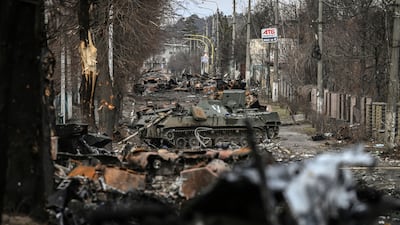Russia has lost three senior commanders including one of its highest-ranked officers as they attempted to give “impetus” to the stalled offensive, western officials have said.
Two generals and a colonel have died on the front line, giving validity to Ukraine military reports of high numbers of Russian deaths and desertions.
A senior official also warned the Russians not to repeat the “risk and recklessness” shown by troops in conducting artillery strikes against a nuclear power plant on Friday.
In a briefing to media, the western source said the deputy commander of the 41st Combined Arms Army had been killed by sniper fire alongside a divisional commander and a regimental commander.

“My assessment would be that those commanders have been killed because they've had to go further and closer to the front,” he said.
“Commanders feel they have to move further forward to get greater impetus and control over operations.
“I think that's an indication of frustration, lack of progress and they're trying to impose their personality on to the battlefield, putting themselves at personal risk.”
Asked by The National if he was surprised by the fatalities of such senior officers only a week into the war, the security official said that commanders clearly felt it was necessary to intervene in failing Russian attacks.
“It has stalled in some areas so badly that I'm unsurprised that commanders have felt the need to go forward to bring some impetus to operations.”
Only one American general was killed during the wars following 9/11 by an Afghan soldier inside a US base in 2014.
The deaths of senior officers are an indication of the difficulties the Russians are facing from the ferocious Ukrainian defence.
There are several problems in terms of logistics, engineering and air support as well as flawed leadership that is having a “psychological impact” on troops, the official said.
The combined-arms attacks from several directions exposed Russia’s command and control fragility and proved “beyond the scale of that which they have trained for”.
“The dislocation of command and control has been significant,” he said. “What they've done is continued to reinforce failure.
“Hammering away at the same objective and hoping to get a different result is perhaps defined as madness.”
A key failure, he added, was the Russians' inability to destroy Ukraine’s air defences in the opening shots of the war. This has not only given their land forces and helicopters less protection from Ukraine’s missiles but has meant that their airborne command and control systems — similar to US Awacs — has not been able to co-ordinate aircraft or ground manoeuvres.
The 64-kilometre-long armoured column that has been stalled 40km outside of Kyiv since at least Monday has been stranded mainly because Ukrainians have destroyed a number of bridges and the Russians lack engineers to fix them.
Also, vehicles destroyed in the column have delayed logistics, with getting around them creating an “enormously large traffic jam”.
Similarly, the failure to rapidly land amphibious ships close to the vital economic hub of Odesa had given the Ukrainians time to sow mines that are hindering operations in the Black Sea.
Referring to the Russian shelling of the Zaporizhzhia nuclear plant on Friday morning, the official said that while it was designed to withstand a direct hit, the attack had caused serious safety concerns, especially over electrical power and security systems.
“The incident today is unprecedented and demonstrates the recklessness of the use of force by Russian military in Ukraine that they have taken such a risk of firing munitions into a nuclear power plant in order to seize control,” he said.
“I sincerely hope that the level of risk and recklessness that was taken this morning is not replicated by Russian forces in any subsequent operation.”




























































